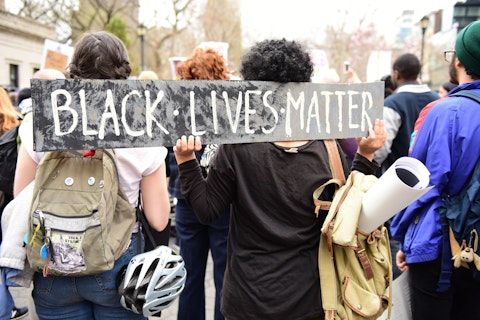In this article, we will list and discuss the 29 States That Have Banned the Critical Race Theory in the US.
Understanding the Critical Race Theory
The origins of the critical race theory (CRT) can be traced as far back as the 1960s when the intellectual movement started emerging within a small group of people in the field of legal studies. Over the years, pioneering thinkers such as Derrick Bell, Patricia Williams, Kimberlé Williams Crenshaw, and Cheryl Harris have all contributed to shaping the theory. The fundamental underpinning of the CRT rests on two elements. Firstly, the idea that race is a socially and culturally constructed notion meant to oppress specific demographics within society. The second factor is the inference that legal institutions within the US are ingrained with systemic racism such that they create as well as maintain all forms of inequalities between people of color and white individuals.
One of the first published discussions on the topic was the idea of ‘interest-convergence’ by Derrick Bell, as published in his 1980 article in the Harvard Law Review, ‘Brown v. Board of Education and the Interest-Convergence Dilemma.’ This is essentially the idea that social changes and civil victories emerge for African-American communities only when their interests align with the broader and more dominant white interests within a society. In a world post the civil rights movement, the CRT has been one of the most pertinent theories in understanding white racism. Rather than casting away racism as a mere negative attitude against particular individuals, it looks at it as a group of legal practices entrenched within a system built to oppress people of color. CRT is basically the idea that understanding the power dynamics amongst various groups is essential to understanding society as a whole.
Criticism of the Theory
Even though active legal measures against the theory are a modern-day phenomenon, its criticism has existed since the beginning. ‘Race, Reform, and Retrenchment: Transformation and Legitimation in Antidiscrimination Law’ was published by Kimberlé Williams Crenshaw in the Harvard Law Review in May 1988. In this article, Crenshaw argued that an institutional campaign was taking place against the critical race theory, as critical legal scholars were moving towards ignoring the notions of ‘racial domination.’
Among the social critiques of the CRT, one of the biggest notions is that the academic teaching of the theory may lead to further division between various groups. Critics also believe that policy leaders may make irrational decisions in order to avoid racism accusations. This can be exhibited by an example from 2021, where the Oregon Department of Education claimed that asking students to show their math homework could be interpreted as an instance of ‘white supremacy,’ as students are taught to only present their way in specific pre-described formats, which might hinder critical thinking. Most opponents believe that the danger of the CRT lies in the fact that it may generalize entire groups as ‘victims’ or ‘oppressors’.
Banning the Theory
In this light, state legislatures have been introducing bills and policies to ban the CRT since 2020. The movement started after a 2020 executive order by President Donald Trump, which outlawed the teaching of ‘divisive’ concepts, including the notion that the US was a systemically racist country. Since then, over 805 measures have been introduced by federal, state, and local governmental agencies that seek to keep up with this order. All of these measures present a ban on teaching CRT in classrooms. Several of these also ban discussions on ‘The 1619 Project’, a journalistic endeavor focusing on the history of slavery within the US. To track efforts to ban CRT teachings, researchers at the UCLA School of Law Critical Race Studies Program created a database known as CRT Forward.
Launched in 2021, the database is meant to be an updated directory of all federal, state, and local-level efforts to block out the teachings of CRT. On April 5, 2023, CRT Forward released a report titled, ‘Tracking the Attack on Critical Race Theory.’ According to its findings, 94% of all enacted measures against CRT targeted K-12 education. Within these measures, 75% regulated curriculum materials, and 73% regulated classroom teaching. One out of three measures introduced by state legislatures provided that withholding funding from school districts would be one of the consequences of violating the ban. The report also found that so far, adopted bans have affected almost 22 million public school students around the country.
As of March 2024, anti-CRT measures have been introduced in all states except for Delaware. However, not every state has managed to pass the legislature. Let’s now take a look at the 29 US states that have banned the critical race theory.

a katz/Shutterstock.com
Our Methodology
Utilizing the CRT Forward tracking database, we have compiled a list of the 29 states that have adopted the ban statewide. The states are ranked in ascending order from least to most measures adopted, with the introduction date of the latest approved measure being the tie-breaking metric.
29 States That Have Banned The Critical Race Theory in the US
29. New Hampshire
Adopted at State-Level: 1 Measure
Introduction of the Latest Approved Measure: March 2, 2021
Legislators in New Hampshire have introduced a total of six measures at the state level, out of which only one has been adopted. The state introduced the legislation on March 2, 2021, targeting K-12 institutions, contractors, and state or federal agencies. The law banned CRT-related discussions in classroom teachings and trainings. Two local-level measures have also been adopted in New Hampshire.
28. Louisiana
Adopted at State-Level: 1 Measure
Introduction of the Latest Approved Measure: May 19, 2021
Out of the seven anti-CRT measures introduced in Louisiana at the state level, only one was adopted. The Attorney General Jeff Landry Statement was introduced on May 19, 2021, and targets classroom teaching, curriculum, and anti-racism policies within K-12 institutions. Discussions on both CRT and The 1619 Project have been outlawed.
27. Nebraska
Adopted at State-Level: Measure
Introduction of the Latest Approved Measure: May 19, 2021
Nebraska also introduced an Attorney General Letter Statement on May 19, 2021, which was adopted on a state-wide level. The statement denounces CRT entirely and prohibits its discussion in all classrooms of K-12 institutions. It is one of the states that have banned the critical race theory in the US.
26. West Virginia
Adopted at State-Level: 1 Measure
Introduction of the Latest Approved Measure: May 19, 2021
A total of 19 state-level legislations were introduced in West Virginia, none of which managed to be approved. However, on May 19, 2021, the state introduced the Attorney General Patrick Morrisey Statement, which did get adopted. One of the mechanisms introduced through this measure was the creation of ‘internet tip lines’, where parents and other community members can submit any complaints of CRT being taught.
25. Maine
Adopted at State-Level: 1 Measure
Introduction of the Latest Approved Measure: February 14, 2023
The state of Maine adopted the House Bill 395, introduced on February 14, 2023. The bill prohibits the discussion of the critical race theory within classroom teaching or the curriculum of K-12 institutions. It also bans the teaching of any ideas that may cause one to feel discomfort, anguish, guilt, or distress on account of their race.
24. Wyoming
Adopted at State-Level: 1 Measure
Introduction of the Latest Approved Measure: May 23, 2023
On May 23, 2023, the Wyoming Superintendent of Public Instruction Megan Degenfelder Statement was introduced in the state of Wyoming, which became the only anti-CRT measure to be adopted at a state-wide level. The state has also adopted a local-level anti-CRT resolution in the Carbon County School District No. 2.
23. Kansas
Adopted at State-Level: 2 Measures
Introduction of the Latest Approved Measure: July 14, 2021
Kansas is one of the US states that have banned the critical race theory. The state has adopted two statements at the state level, the latest of which was introduced on July 14, 2021, by the Kansas Department of Education. A local-level statement by the Lansing School Board and a policy by Lansing USD 469 have also been approved in the Lansing local school district.
22. North Carolina
Adopted at State-Level: 2 Measures
Introduction of the Latest Approved Measure: March 23, 2023
Senate Bill 364 was introduced in North Carolina on March 23, 2023, targeting all contractors and state or federal agencies. The bill covers training and prohibits any actions and trainings that may make someone of a particular race feel any guilt or mental distress. A total of 10 measures have also been adopted at the local level by counties and school districts.
21. Alabama
Adopted at State-Level: 3 Measures
Introduction of the Latest Approved Measure: January 5, 2022
The legislature statement from January 5, 2022, is the latest anti-CRT state-level measure to be adopted in Alabama. The statement denounces CRT and targets classroom teaching in K-12 and higher educational institutes. The statement also deems anything that invokes the critical race theory as a ‘content trigger.’
20. Montana
Adopted at State-Level: 3 Measures
Introduction of the Latest Approved Measure: July 13, 2022
Montana is one of the US states that have banned the critical race theory. On July 13, 2022, the state introduced its latest anti-CRT measure to be approved, a regulation by the Montana Board of Public Education. This regulation targets both K-12 institutions and also higher educational institutes, suppressing CRT-related discussions in their anti-racism policies.
19. Iowa
Adopted at State-Level: 3 Measures
Introduction of the Latest Approved Measure: March 14, 2023
Three of the seven anti-CRT measures introduced in Iowa at the state level have been approved. The latest is the Board of Regents, State of Iowa Policy, introduced on March 14, 2023. The regulation targets anti-racism policies in higher education institutes, preventing them from delving into CRT-related topics.
18. Mississippi
Adopted at State-Level: 3 Measures
Introduction of the Latest Approved Measure: April 6, 2023
Mississippi has adopted three anti-CRT measures at the state level; hence, it is one of the states that have banned the critical race theory in the US. These measures include Senate Bill 2113, Attorney General Lynn Fitch Statement, and the Mississippi Office of the State Auditor Policy. The policy is the latest measure to be adopted, having been introduced on April 6, 2023.
17. Kentucky
Adopted at State-Level: 3 Measures
Introduction of the Latest Approved Measure: March 14, 2024
Kentucky is one of the states that have banned the critical race theory in the US. The Attorney General Russell Coleman Letter was recently introduced in the state on March 14, 2024. It is the latest state-level anti-CRT measure to be adopted in the state. In total, 12 measures have been introduced in the state, but only three have been accepted.
16. Idaho
Adopted at State-Level: 4 Measures
Introduction of the Latest Approved Measure: February 14, 2022
Idaho has adopted four anti-CRT measures at the state level and three at the local level. All the measures target K-12 institutes, whereas two prohibit CRT-related teachings at the higher education level as well. The Senate Concurrent Resolution 118 is the latest approved measure to have been introduced, on February 14, 2022.
15. Virginia
Adopted at State-Level: 4 Measures
Introduction of the Latest Approved Measure: January 23, 2022
Virginia is one of the US states that have banned the critical race theory, with a total of four state-level and 14 local-level measures. Virginia is another one of the states where internet tip lines have been created as a mechanism for people to report complaints against CRT teachings.
14. North Dakota
Adopted at State-Level: 4 Measures
Introduction of the Latest Approved Measure: January 13, 2023
At the state level, six anti-CRT measures have been introduced in North Dakota, of which four have been accepted. Six local-level measures have also been put in place. The measures cover both K-12 and higher education institutes, implementing prohibitions in classroom teachings, curriculum content, and trainings.
13. South Carolina
Adopted at State-Level: 4 Measures
Introduction of the Latest Approved Measure: March 7, 2023
South Carolina is one of the states that have banned critical race theory in the US, having approved four anti-CRT measures on a statewide level. A total of 24 state-level measures were introduced from 2021-2023, of which four managed to get adopted or enacted. Three of these were House Bills, whereas one was a statement by Attorney General Alan Wilson.
12. Ohio
Adopted at State-Level: 4 Measures
Introduction of the Latest Approved Measure: March 14, 2023
In Ohio, 12 anti-CRT measures were introduced at the state level, of which four were accepted. On the other hand, eight were introduced at the local level, of which seven were approved. Senate Bill 83, introduced on March 14, 2023, approves curricular surveillance at the higher education level, with the enforcement mechanism being the withholding of funding.
11. Utah
Adopted at State-Level: 6 Measures
Introduction of the Latest Approved Measure: January 18, 2024
Utah has approved six anti-CRT measures at the state level and two at the local level. House Bill 261, introduced on January 18, 2024, restricts higher education institutes and state or federal agencies. The specified enforcement mechanisms were withheld funding and private cause of action.
10. Indiana
Adopted at State-Level: 6 Measures
Introduction of the Latest Approved Measure: January 17, 2023
Indiana is one of the states that have banned the critical race theory in the US by adopting six measures at the state level and five measures at the local level. The measures denounce the CRT entirely and prohibit any mention of this theory or the 1619 project. CRT is prohibited from being taught in K-12 institutes.
9. Missouri
Adopted at State-Level: 6 Measures
Introduction of the Latest Approved Measure: February 14, 2023
Missouri has been one of the most prolific states in terms of anti-CRT measures, with almost 46 of them being introduced at the state level. Out of these, only six have been enacted so far, which makes it one of the states that have banned CRT within the US.
8. Oklahoma
Adopted at State-Level: 7 Measures
Introduction of the Latest Approved Measure: April 27, 2023
On October 8, 2022, Bloomberg reported that tribal nations in Oklahoma had been demanding a repeal of its anti-CRT measure. The demand was based on the idea that these measures prevent the state’s complex history from being taught to its students. Yet, Oklahoma continues to be a state where CRT is banned from being taught in K-12 institutes or within higher education.
7. Arizona
Adopted at State-Level: 7 Measures
Introduction of the Latest Approved Measure: August 26, 2023
After adopting several measures to ban CRT teachings, in 2023, the Arizona Department of Education launched a hotline that community members could utilize to complain about any classroom lessons where CRT was being taught, as reported by AP News. Arizona has adopted seven anti-CRT measures at the state level and two at the local level.
6. Tennessee
Adopted at State-Level: 8 Measures
Introduction of the Latest Approved Measure: February 1, 2023
The Sullivan County Central High School suspended two different instructors after receiving complaints that they had discussed race and racism within their classes. The state has enacted eight anti-CRT measures at the state level and two at the local level in Rutherford County and Williamson County.
5. Georgia
Adopted at State-Level: 8 Measures
Introduction of the Latest Approved Measure: May 11, 2023
According to the CRT Forward Report, House Bill 1084, implemented in Georgia, pushes school districts to implement local-level anti-CRT measures that are in compliance with the state bill. Georgia has passed eight of the 14 anti-CRT measures introduced at the state level.





